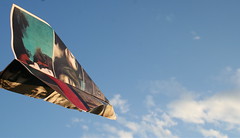Tuesday, May 29, 2007
Flat Earth and EDEN 2007
I've been looking at the EDEN 2007 programme and on day 2 the theme of the key-notes seems to be new trends (i.e. web 2.0) and institutional/national policy. Sometimes it seems as if the policy makers and the actors in a new area are refusing to look at one another. The policy-makers are reluctant to listen. Is this a bad thing? Looking backwards we can see which trends have become accepted practice, but we tend to forget the trends that disappeared without trace. As I wrote above, a certain element of scepticism is wise, even if the sceptics are wrong at times.
Tuesday, May 22, 2007
Digital literacy and folkbildning conference

Today I was at a conference looking at digital literacy and folkbildning in Stockholm. One of the problems is defining digital literacy, and thereby defining the groups who need to be helped and therefore which methods are likely to be helpful. For example one group are those who have never used a computer/internet at all, another group those who can use a computer but see no reason to do so. A third group are perhaps computer literate but lack the skills required (traditional literacy skills?) to be an active and democratic user of the new digital world. And so on, the list is long!
The problem is becoming more acute because more and more of the functions of society are moving online and not being digitally literate is becoming a real disadvantage. More and more of the discourse inside society is also moving online. Developing professional skills, as a teacher for example, requires digital literacy.
Another discussion is that as the development of internet progresses more and more rapidly the whole field becomes more complicated with more to learn and the catch-up process becomes longer and more difficult. New groups become disadvantaged - if you can't use the tools defined loosely as web 2.0 are you partially digitally illiterate, even if you are an expert in other areas of the digital world?
On the other hand one of the hurdles to overcome is failure to understand why digital literacy is so important and society moving online can also be a motivating factor to go out and become digitally literate. Another part of the development mentioned above is that active use of internet is being made easier (web 2.0 again), and activity makes learning easier.
The discussion continues....
PS The picture is part of an artwork by Andrew Pepper - "Artwork or Network". see also "One Million Points of Light" by the same artist.
Monday, May 14, 2007
Salaries - discussions on policy
It is interesting to see how much more efficient we are this time compared with when we started this work a year ago. There is more trust and understanding between these two groups.
Friday, May 11, 2007
Friday work development
Something that interests me personally is web 2.0 and art. Hence the picture....
Thursday, May 10, 2007
Reflections - Using a Web 2.0 Credo...
Back from the meeting I read a blog which summed up our conversation and provided something of an answer too. It gave a credo for a school wanting to work in a web 2.0 context.
The original reference came from Will Richardson's blog for the 25 April.
Monday, May 07, 2007
Clipmarks - another form of social bookmarking
|



